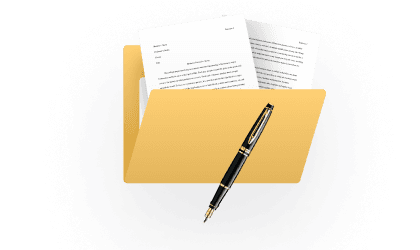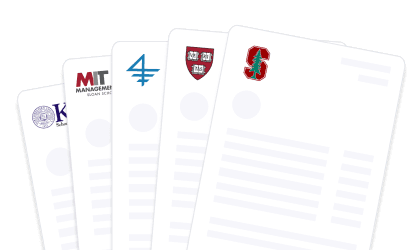Last-Minute ACT & SAT Tips to Boost Your Score
Are you feeling the pressure of the upcoming SAT/ACT exams? Don't worry, we've got you covered! Our article provides last-minute preparation tips to help boost your score a few points.
Posted June 13, 2025

Join a free event
Learn from top coaches and industry experts in live, interactive sessions you can join for free.
Table of Contents
If your test date is quickly approaching, you might be feeling anxious about how to make the most of your final days of preparation. While months of studying is ideal, the right last-minute preparation can still help you gain a few crucial points on your SAT or ACT test. Whether you're aiming for a great score to enhance your college applications or striving for scholarship eligibility, applying last-minute SAT tips and last-minute ACT tips can make a real difference.
In this guide, we’ll cover actionable last-minute tips to improve your SAT scores and ACT scores, strategies for tackling each section efficiently, and key advice for staying sharp on test day.
Why Last-Minute Preparation Still Matters
Even if you haven’t had months to prepare, strategic last-minute preparation can refine your approach to the test format and give you a confidence boost.
- Familiarize yourself with the test format - Understanding the structure of the real test helps reduce surprises. The SAT consists of a reading section, a math section, a writing section, and an optional essay. The ACT test has an additional science section and different time limits per section.
- Focus on high-yield topics - Reviewing key concepts like linear equations for the ACT math section, subject-verb agreement for the writing section, and passage analysis for the reading section can help you earn easy points quickly.
- Take a full-length practice test - A timed practice test simulates the actual test environment and helps with practice pacing—a good strategy for improving time management.
How to Create a Tactical Study Plan
With limited time before your test date, an efficient and strategic study plan can make a significant difference in your SAT or ACT scores. The key is to focus on your weak areas, use high-quality study resources, and simulate real test conditions. By combining smart review techniques with mental and physical preparation, you can maximize your potential in the final days before the exam.
Prioritize Weak Areas
Instead of trying to study everything, focus on the areas where you struggle the most. Start by reviewing past mistakes from practice questions and identifying common patterns in your errors.
For the math section, revisit essential topics like linear equations, geometry, and word problems, ensuring you understand the formulas and concepts behind them.
In the reading section, work on improving comprehension by summarizing passages, identifying main ideas quickly, and practicing pacing to avoid running out of time.
For the writing section, brush up on fundamental grammar rules, such as subject-verb agreement and punctuation, to ensure you recognize and correct errors efficiently. By prioritizing your weakest areas, you’ll see the most improvement in the shortest amount of time.
Use High-Quality Study Resources
To get the most accurate and effective practice, it’s best to use trusted and comprehensive College Board study resources. The right materials will help you familiarize yourself with real test questions, effective test-taking strategies, and high-yield topics that appear frequently on the SAT and ACT. Rather than wasting time on scattered or unreliable sources, focus on well-structured resources that offer practice questions, test-taking strategies, and expert guidance.
For a curated list of the best free SAT and ACT study resources, check out Leland’s guide, where you’ll find expert-recommended tools to help maximize your preparation. Using high-quality materials ensures that you are practicing with accurate, up-to-date content and developing the skills needed to perform well on test day.
Simulate Real Test Conditions
One of the best ways to prepare for the real test is to take at least one full-length practice test under test-day conditions. This means sitting in a quiet space, following real-time limits, and limiting distractions. Using a timing device like your own watch can help you track your remaining time in each section, improving your practice pacing and ensuring you complete all questions before time runs out.
To further replicate the testing center environment, turn off all electronic devices and follow the standard break schedule—both the SAT and ACT include two breaks, so practicing refocusing after breaks can be beneficial. The more comfortable you are with the actual test format, the more confident and prepared you’ll feel on test day.
Balance Study with Mental Preparation
Maximizing your score isn’t just about studying—it’s also about taking care of yourself. Getting a good night’s sleep before the test date is crucial, as all-nighters can negatively impact memory and focus. Eating a healthy breakfast on test day, with protein and complex carbohydrates, can prevent energy crashes and keep you sharp during the exam.
Managing test anxiety is also important; try deep breathing exercises, light stretching, or meditation to stay calm and focused. Keeping your blood flowing with some light movement before the test can also enhance your alertness and cognitive function. A well-rested and mentally prepared test-taker will perform better than someone who is exhausted and overwhelmed.
Read: ACT Game Plan: How to Master Every Section and Concept and SAT Game Plan: How to Master Every Concept
Last Minute Tips for Your ACT/SAT Test
Feeling nervous before a standardized test is completely normal, but it shouldn’t impact your performance or confidence. Instead of letting stress take over, use proven strategies to stay calm, focused, and mentally sharp before and during the exam.
1. Get a good night’s sleep
Your brain functions best when it's well-rested, so avoid the temptation to pull an all-nighter before your test date. Sleep deprivation reduces focus, memory retention, and decision-making ability, which are all crucial for success on the SAT or ACT. Aim for at least 7–9 hours of sleep and try to stick to your regular bedtime routine. If you have trouble sleeping due to nerves, practice relaxation techniques like deep breathing or meditation the night before.
2. Eat a balanced breakfast
What you eat on test day plays a major role in your energy levels and concentration. Eating breakfast with protein, fiber, and complex carbs will help maintain steady energy levels throughout the exam. Eggs, whole-grain toast, oatmeal, yogurt, or a smoothie are great options. Avoid high-sugar foods that can lead to an energy crash. If you drink coffee, have it in moderation to avoid jitters, and make sure to stay hydrated with water.
3. Pack your essentials the night before
Avoid unnecessary stress by packing everything you need ahead of time. Make a checklist and ensure you have:
- Photo ID – Required for entry at most testing centers.
- Admission ticket – Print it out and place it in your bag.
- Calculator with new batteries – Not all questions require it, but it’s crucial for the math section.
- Own watch – Helps you keep track of your remaining time, especially if no clocks are visible.
- Healthy snacks and water – For the two breaks, maintain focus and avoid energy dips.
- Comfortable clothing – Dress in layers so you can adjust to the testing room temperature.
4. Get moving to stay alert
Light exercise before the exam can boost circulation, increase oxygen flow to the brain, and improve alertness. A quick walk, some stretching, or even a few jumping jacks can help reduce stress and wake up your mind before heading to the testing center. If you have time, practice a few easy questions or review key concepts in the morning to get into a focused mindset.
Test Section-Specific Strategies
Reading Section
The reading section is all about speed and accuracy. With multiple passages to analyze under tight time constraints, strategic reading is key.
- Skim first, then read deeply. Quickly scan the passage to understand its main idea and structure before diving into the details. This prevents wasting time re-reading unnecessary parts.
- Focus on key concepts. Questions typically ask about main ideas, tone, inferences, and evidence, so pay attention to topic sentences and conclusions.
- Answer strategically. Start with the easiest questions first and save tougher, time-consuming ones for later. This prevents getting stuck and running out of time.
- Use the process of elimination. If unsure, cross out clearly incorrect answer choices to increase your odds of selecting the correct answer.
- Practice pacing. The section is time-sensitive, so if a question is taking too long, make your best guess and move on.
Math Section
The math section challenges both speed and accuracy, so using efficient problem-solving techniques is crucial.
- Memorize key formulas. The ACT math section does not provide a formula sheet, so commit common equations to memory. The SAT math section includes one, but knowing formulas by heart can save time.
- Use strategic guessing. There is no penalty for wrong answers, so never leave a question blank. Eliminate at least one wrong answer before guessing.
- Work efficiently. For multi-step problems, solve quickly but accurately—showing your work helps avoid careless mistakes.
- Check your work. If you finish early, review answers for sign errors, miscalculations, and overlooked details.
- Manage time wisely. Don’t get stuck on one problem; if a question is too difficult, skip it and return later if time allows.
Watch: SAT Prep - How to Solve Quadratics
Writing Section
The writing and language section rewards clarity and precision. Strong grammar and logical sentence structure will help you select the best answer choices.
- Choose the most concise, clear answer. The test favors simpler, direct wording over long or redundant phrases.
- Know essential grammar rules. Focus on subject-verb agreement, punctuation, pronouns, modifiers, and sentence structure—these frequently appear in the test.
- Plan your essay (if applicable). If you’re taking the optional SAT or ACT essay, structure your response before writing. Ensure your argument is clear, well-supported, and logically organized.
Read: Should You Take the ACT With Writing: Pros, Cons, and How to Decide
Test Day Strategies: What to Do at the Testing Center
How you manage test day logistics can significantly affect your performance and confidence.
- Arrive early - Plan to be at your testing center at least 30–45 minutes before check-in to avoid last-minute stress.
- Follow test rules - Leave cell phones, electronic devices, and unauthorized materials at home. Many testing centers have strict rules, and violations can lead to disqualification.
- Use breaks wisely - The test includes two breaks, so stretch, drink water, and eat a light snack to stay energized. Avoid discussing questions with others—it can increase anxiety.
- Manage time effectively - Keep an eye on your own watch (since not all test rooms have clocks) and pace yourself so you complete every section without rushing.
Final Review - Night Before the Test
The night before your ACT or SAT is just as important as your study sessions. Instead of cramming, focus on reinforcing key concepts, preparing your test-day essentials, and getting a full night’s sleep. Review high-yield topics you’ve struggled with, confirm that you have your admission ticket, photo ID, calculator, and supplies ready, and go to bed early. Research shows that a well-rested brain performs significantly better than one running on exhaustion, so prioritize rest over last-minute studying.
The Value of Expert Guidance
Your upcoming ACT test or SAT is a major milestone, and while these last-minute SAT tips and last-minute ACT tips can help, the best way to maximize your score is by learning from top ACT and SAT test prep coaches. These experts understand test format, scoring strategies, and proven methods to help students reach their highest potential.
Read next:
- The ACT vs. SAT: Which to Take and How to Ace Both
- Test-Optional: What Does it Mean and Should I Take the ACT or SAT?
- How to Turn ACT and SAT Scores into Scholarship Money
FAQs
Is it beneficial to take a full-length practice test the day before the exam?
- While practice tests are essential during preparation, taking a full-length test the day before the exam is generally discouraged. It's better to review key concepts and relax to ensure you're well-rested for test day.
How can I quickly improve my vocabulary for the verbal sections?
- Focus on understanding common prefixes, suffixes, and root words. This strategy helps deduce the meaning of unfamiliar words during the test.
Are there any specific strategies for the science section of the ACT?
- Yes, prioritize interpreting data from graphs and tables, as many questions are based on these. Practice identifying trends and drawing conclusions from scientific data.
Should I bring a snack to the testing center?
- Absolutely. Bringing a light snack can help maintain energy levels during breaks, aiding concentration throughout the exam.
What should I do if I start feeling anxious during the test?
- Practice deep breathing techniques to calm nerves. Taking a few slow, deep breaths can help refocus and reduce anxiety.
Is it advisable to study with friends the night before the test?
- It's better to study alone to focus on personal weak areas without distractions. Group study sessions can introduce stress or lead to off-topic discussions.
How important is physical exercise before the test?
- Engaging in light physical activity, like a short walk or stretching, can boost blood flow and improve mental alertness on test day.
































